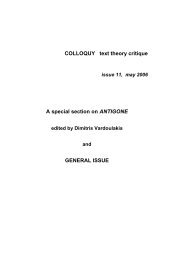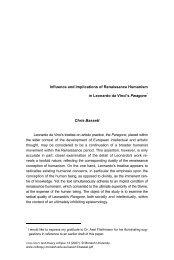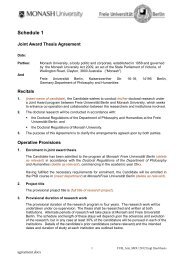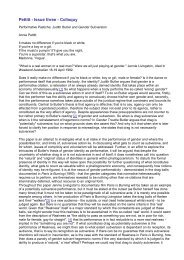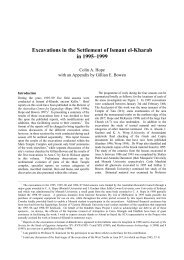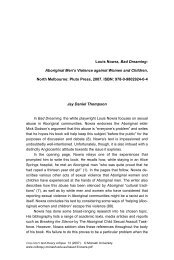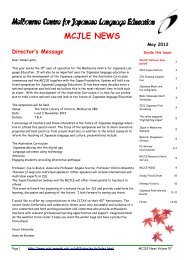The Acknowledgement of Love in Sarah Ruhl's Drama ... - Arts
The Acknowledgement of Love in Sarah Ruhl's Drama ... - Arts
The Acknowledgement of Love in Sarah Ruhl's Drama ... - Arts
Create successful ePaper yourself
Turn your PDF publications into a flip-book with our unique Google optimized e-Paper software.
░ <strong>The</strong> <strong>Acknowledgement</strong> <strong>of</strong> <strong>Love</strong> <strong>in</strong> <strong>Sarah</strong> Ruhl’s <strong>Drama</strong> 2115Truth and Method, 357.Stanley Cavell, “<strong>The</strong> Ord<strong>in</strong>ary as the Uneventful,” <strong>The</strong> Cavell Reader, ed. StephenMulhall (Oxford: Blackwell, 1996): 258.16 Zygmunt Bauman, Liquid <strong>Love</strong>: On the Frailty <strong>of</strong> Human Bonds (Cambridge: Polity,2003), 8.17 Danitia Smith, “Playwright’s Subjects: Greek Myth to Vibrators,” <strong>The</strong> New YorkTimes 14 (October 2006), http://www.nytimes.com/2006/10/14/theater/14ruhl.html18 Charles Isherwood, “A Comic Impudence S<strong>of</strong>tens a Tale <strong>of</strong> Loss,” <strong>The</strong> New YorkTimes 3 (October 2006),http://theater.nytimes.com/2006/10/03/theater/reviews/03eury.html?pagewanted=all19 Bullf<strong>in</strong>ch’s classic account <strong>of</strong> the myth is a touchstone:Eurydice, shortly after her marriage, while wander<strong>in</strong>g with the nymphs, hercompanions, was seen by the shepherd Aristaeus, who was struck by herbeauty and made advances to her. She fled, and <strong>in</strong> fly<strong>in</strong>g trod upon asnake <strong>in</strong> the grass, was bitten <strong>in</strong> the foot, and died. Orpheus sang his griefto all who breathed the upper air, both gods and men, and f<strong>in</strong>d<strong>in</strong>g it all unavail<strong>in</strong>gresolved to seek his wife <strong>in</strong> the regions <strong>of</strong> the dead…. Eurydicewas called. She came from among the new-arrived ghosts, limp<strong>in</strong>g withher wounded foot. Orpheus was permitted to take her away with him onone condition, that he should not turn around to look at her till they shouldhave reached the upper air. Under this condition they proceeded on theirway, he lead<strong>in</strong>g, she follow<strong>in</strong>g, through passages dark and steep, <strong>in</strong> totalsilence, till they had nearly reached the outlet <strong>in</strong>to the cheerful upperworld, when Orpheus, <strong>in</strong> a moment <strong>of</strong> forgetfulness, to assure himself thatshe was still follow<strong>in</strong>g, cast a glance beh<strong>in</strong>d him, when <strong>in</strong>stantly she wasborne away.Thomas Bulf<strong>in</strong>ch, Bulf<strong>in</strong>ch’s Mythology (New York: <strong>The</strong> Modern Library,1934), 151–52.20 Ovid, <strong>The</strong> Metamorphoses <strong>of</strong> Ovid, trans. Mary M. Innes (New York: Pengu<strong>in</strong>,1955), 226.21 Ruhl, “More Invisible Terra<strong>in</strong>s,” 30.22 Ra<strong>in</strong>er Maria Rilke, <strong>The</strong> Selected Poetry <strong>of</strong> Ra<strong>in</strong>er Maria Rilke, trans. StephenMitchell (New York: Vik<strong>in</strong>g, 1989), 51.23 Ibid. 51.24 <strong>The</strong> ancient accounts <strong>of</strong> the myth give Eurydice little agency. Apollodorus, for example,presents the rescue as a deal strictly between Orpheus and Pluto: “Andwhen his wife Eurydice died, bitten by a snake, he went down to Hades, be<strong>in</strong>g fa<strong>in</strong>to br<strong>in</strong>g her up, and he persuaded Pluto to send her up.” Apollodorus, <strong>The</strong> Library,trans. J.G. Frazer (<strong>The</strong> <strong>The</strong>oi Classical E-Texts Library),http://www.theoi.com/Text/Apollodorus1.html.25 Accord<strong>in</strong>g to his account <strong>of</strong> love, each human be<strong>in</strong>g was orig<strong>in</strong>ally bound to another.Zeus split each bound pair <strong>in</strong>to two <strong>in</strong>dividuals, which gave birth to desire:each <strong>in</strong>dividual sought to f<strong>in</strong>d his or her miss<strong>in</strong>g half. Thus, Aristophanes con-







